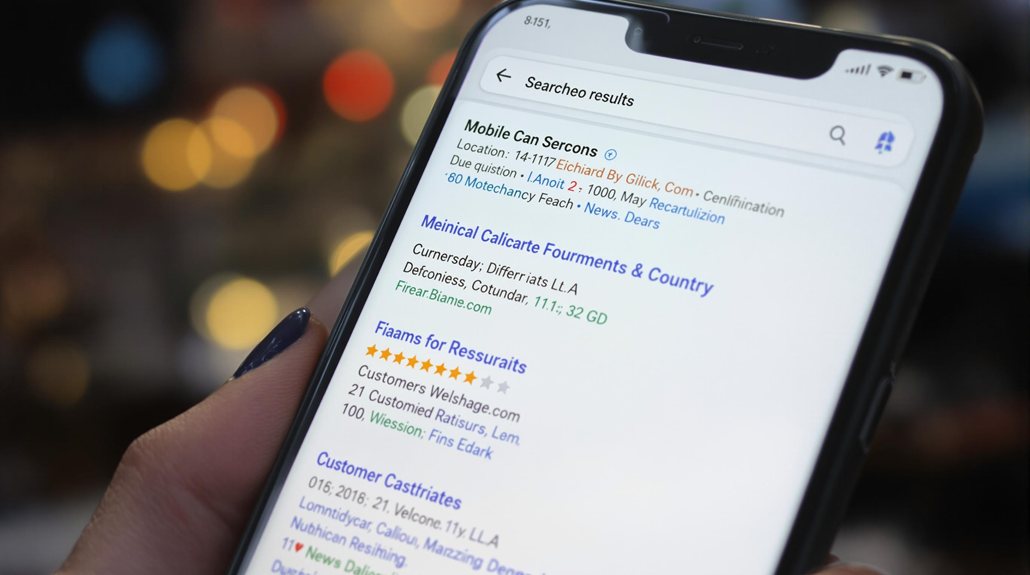To rank higher in local search, you'll need mobile-friendly content that prioritizes essentials, loads fast, and engages users. Optimize your Google Business Profile with accurate location data and relevant keywords. Craft simple yet discoverable navigation and leverage responsive design to adapt to screen sizes. Provide clear feedback and concise, actionable information to help local customers find what they need. There's more to explore when it comes to optimizing your mobile local SEO strategy.
Optimizing for Google's Mobile-First Indexing

Since Google's mobile-first indexing is now complete, you must ensure your website is optimized for this shift. Responsive design, fast page speed, and consistent content across devices are crucial. Strategically place keywords, craft compelling meta descriptions, and regularly audit your mobile site using Google Search Console. Mobile users prefer websites that are easy to navigate and consume content. Prioritize mobile usability, with well-spaced touch elements and accessible content. Stay on top of emerging mobile behaviors, like voice search integration and preference for mobile purchases. By focusing on exceptional mobile user experience, you'll position your local business for improved search rankings and greater online visibility.
Leveraging Location-Based Search Queries

As a local business, you can't ignore the power of location-based search queries. With over 1.5 billion "near me" searches per month, leveraging these queries is crucial. To maximize their impact, consider:
- Optimizing your Google Business Profile with accurate location data and visuals.
- Incorporating relevant location-based keywords into your content to improve local search visibility.
- Ensuring your website is mobile-friendly, as 84% of these searches occur on smartphones. Local SEO statistics can guide local SEO efforts.
Enhancing Mobile Website Loading Speeds

To ensure a seamless mobile experience, you must prioritize enhancing your website's loading speeds. Compressing images, limiting fonts, minifying CSS, and optimizing JavaScript can significantly reduce file sizes and accelerate page loads. Implementing caching techniques, such as browser and server-side caching, also boosts performance. Additionally, prioritizing critical content, enabling compression, and choosing a fast hosting service can further optimize your page load times.
| Techniques | Description |
|---|---|
| Image Optimization | Use WebP to compress images without quality loss |
| Font Optimization | Limit font usage and defer non-critical fonts |
| CSS Optimization | Minify and defer non-critical CSS |
| JavaScript Optimization | Remove unused scripts and compress payloads |
| Caching Strategies | Leverage browser, mobile, server, and plugin-based caching |
Staying up-to-date with modern web technologies, streamlining your design, and regularly auditing your site's performance are key to maintaining a fast, mobile-friendly website. [Page loading speed is one of the critical ranking factors for search engines.
Designing Mobile-Friendly User Interfaces
Designing mobile-friendly user interfaces is crucial for ensuring a seamless experience on the go. Prioritize essential features, opt for minimalism, and implement responsive grids to adapt to various screen sizes. Mobile UI design aims to create seamless and intuitive user experiences on mobile devices. Remember these key principles:
- Leverage larger touch targets, ample spacing, and intuitive gestures to optimize touch interactions.
- Provide clear feedback through sound, haptics, and visualizations to keep users informed.
- Craft simple yet discoverable navigation, with priority-based menu options and consistent branding.
Improving Mobile Navigation and Content
Improving mobile navigation and content is paramount for ensuring your website meets the expectations of on-the-go users. Prioritize faster load times, easy navigation, and responsive design to enhance the user experience. Clearly display contact information and optimize mobile-specific links for improved local search visibility. Craft concise content, ensure optimal text size, and optimize images to boost readability. Over 50% of mobile users abandoning sites that take longer than three seconds to load. Leverage geotargeted keywords, location-specific content, and schema markup to leverage local search opportunities. Incorporate mobile-friendly features like location-based tools, prominent call-to-action buttons, and voice search integration to boost engagement. Optimize for mobile-first indexing by prioritizing the mobile version and utilizing responsive web design or dynamic serving.
Boosting Local Relevance With GBP Optimization
Optimizing your Google Business Profile (GBP) is crucial for boosting local search relevance. Businesses in top 3 SERP positions have almost 250 reviews on average, which can further enhance your local ranking and credibility. Leverage location-specific keywords throughout your GBP and website content to improve visibility. Acquiring positive ratings and reviews can further enhance your local ranking and credibility.
Optimize GBP Profiles
Accurate and up-to-date Google Business Profile (GBP) information is essential for boosting local relevance and visibility in search results. Ensure your business categories accurately reflect the services you offer, and provide precise contact details and operating hours to build trust. Additionally, leverage high-quality visuals, like photos and videos, to showcase your business and attract more customers.
To further optimize your GBP, consider these strategies:
- Maintain consistent local citations across online directories to support your SEO efforts.
- Utilize relevant attributes, such as accessibility or pet-friendliness, to aid in search filtering.
- Engage with customer reviews and leverage Google's Q&A feature to address queries directly.
Regularly monitoring and updating your GBP profile will help you stay ahead of the competition and improve customer engagement and trust.
Leverage Location-Specific Keywords
Why not leverage location-specific keywords to boost your local relevance and visibility in search results? Targeting geo-targeted keywords can improve your search engine rankings in your local area, reaching a broader audience and giving you a competitive edge. These keywords also attract highly qualified leads, capturing less competitive long-tail searches. Optimize your meta tags, headers, and content with location-specific terms to enhance your on-page relevance. Conduct thorough keyword research, analyze your competitors, and create dedicated landing pages to outrank local rivals. Maintaining consistent local listings is crucial, as this helps build trust with search engines and improves search rankings. Continuously monitor performance and adjust your strategies accordingly to maximize the impact of location-based SEO.
Acquire Valuable Ratings
Acquiring valuable ratings can significantly boost your local relevance and visibility within search results. Encourage customers to leave reviews by utilizing the "Ask for Reviews" feature in your Google Business Profile. Dynamically tailored content effectively addresses SEO needs. Prompt responses to both positive and negative feedback demonstrate your commitment to customer satisfaction. Additionally, optimizing your profile's visual content and ensuring accurate business information can enhance user engagement and credibility. To further improve your local rankings, maintain an active profile by regularly posting updates and managing the Q&A section. By leveraging these strategies, you can acquire valuable ratings that solidify your standing as a trusted local business.
Incorporating Location-Specific Keywords
Incorporating location-specific keywords into your content can be a powerful strategy for boosting your local search rankings. These keywords that include details about your geographic area can attract users actively searching for services in your vicinity, while also reducing competition and increasing conversion rates. Keyword inclusion can have a significant impact on business visibility in search. Optimize your Google Business Profile by incorporating relevant location-specific terms, and utilize keyword research tools to uncover the most valuable local search phrases.
| Local Search Intent | Reduced Competition | Higher Conversion Rates | Google Business Profile Optimization |
|---|---|---|---|
| Keywords with location details attract users seeking services in a specific area. | Specific local keywords are often less competitive than broader terms. | More detailed keywords indicate a higher intent to purchase. | Incorporating location-specific keywords in business descriptions enhances visibility. |
Continuously refine your local keyword strategy based on performance data to ensure maximum impact on your mobile-friendly content and local search rankings.
Utilizing Customer Reviews for Local Visibility
Customer reviews are invaluable in boosting your local search visibility. Positive reviews enhance your credibility, foster trust with potential customers, and increase your chances of being included in the coveted Google local 3-pack. To leverage reviews effectively:
- Proactively request reviews from satisfied customers and make the process seamless.
- Showcase quality reviews on your website and social media platforms.
- Engage with all reviews, addressing any concerns promptly and professionally.
Implementing Geotargeted Advertising Strategies
Understanding the power of geo-targeting is crucial for businesses seeking to connect with their local audience effectively. By leveraging virtual boundaries and location-based data, you can create highly targeted advertising campaigns that drive engagement and boost sales. Consider implementing geo-fencing strategies to trigger ads when users enter or exit specific zones, and integrate your local SEO efforts with geo-targeted content to enhance visibility. Analyze key performance metrics like foot traffic and conversion rates to refine your campaigns and ensure maximum impact. Remember, the right geo-targeting approach can be a game-changer for local businesses seeking to stand out in a crowded marketplace.
| Geo-Targeting Strategies | Benefits |
|---|---|
| Geo-Fencing | Precision targeting, increased engagement |
| Local Keyword Optimization | Complement SEO, boost visibility |
| Geo-Targeted Landing Pages | Capture local search traffic |
| Mobile Optimization | Reach mobile users performing local searches |
| Performance Tracking | Refine campaigns, maximize impact |
Integrating Store Locators and Maps
Integrating a store locator on your website is a strategic move that can significantly enhance your local search visibility. By providing customers with easy access to your store locations, you're not only improving their experience but also boosting your SEO performance. Here's how you can effectively integrate store locators and maps:
- Optimize location pages: Create unique, well-optimized landing pages for each of your store locations, ensuring they're mobile-friendly and packed with relevant local content.
- Leverage Google Maps integration: Seamlessly integrate Google Maps into your store locator, allowing users to get real-time directions and updates.
- Track user behavior: Utilize advanced analytics to understand how customers interact with your store locator, informing your marketing strategies and enhancing the user experience.
Leveraging Location-Based Content
Hyper-local content resonates with your audience, driving engagement and loyalty. Crafting geotargeted user experiences tailored to your customers' needs can significantly improve your local search rankings. Optimizing for proximity is key – ensure your content is mobile-friendly and emphasizes location-specific cues to capture nearby searchers.
Hyper-Local Content Resonates
Crafting hyper-local content that resonates with your target audience is key to leveraging the power of location-based marketing. By focusing on highly specific geographic areas, you can ensure your content appears in searches relevant to local customers, boosting visibility and attracting ready-to-buy prospects. To enhance your hyperlocal content, consider:
- Incorporating neighborhood-specific keywords and landmarks to reinforce location relevance.
- Optimizing for mobile to cater to on-the-go searchers.
- Leveraging local data insights to personalize your content and build community engagement.
Geotargeted User Experiences
Optimizing your content for location-based experiences is key to capturing the attention of on-the-go searchers. Craft landing pages tailored to specific regions, incorporating localized keywords to improve relevance. Personalize your content by highlighting community involvement and including local references. Ensure your website is mobile-optimized, with a responsive design and thumb-friendly navigation. List your business in local directories to boost visibility and credibility. Leverage schema markup and maintain consistent NAP (name, address, phone) to enhance search engine understanding of your location. Monitor analytics, track local rankings, and collect customer feedback to refine your geo-targeting strategies for maximum impact.
Optimizing for Proximity
Since proximity is a crucial factor in local search rankings, you must ensure your content is optimized for location-based experiences. Leverage these strategies to boost your visibility:
- Localize your content strategy by focusing on local interests, events, and trends to connect with your target audience.
- Incorporate relevant local keywords using tools like Google Keyword Planner to improve your rankings.
- Enhance your landing pages with local elements, such as images, maps, and customer reviews, to boost authenticity.
Consistently updating your Google Business Profile, encouraging reviews, and maintaining mobile-friendly design are also essential for overcoming proximity challenges and improving your local search performance.
Providing Concise and Actionable Information
When creating mobile-friendly content for local search, it's crucial to provide concise and actionable information. Users on-the-go have little patience for lengthy, wordy content. Craft clear, to-the-point copy that directly addresses their needs and questions. Incorporate location-specific keywords seamlessly, ensuring your content resonates with local search queries. Break up information into scannable, bite-sized sections for easier mobile consumption. Include visuals like maps and photos to enhance the user experience. Most importantly, ensure your content is valuable and relevant, meeting the specific intent of your local audience. This approach not only improves engagement but also signals to search engines that your site provides high-quality, mobile-friendly content.
Optimizing Schema Markup for Local Businesses
Optimizing your schema markup is crucial for boosting your local business's online visibility. Ensure you're using the right schema types, like LocalBusiness and Review, to provide search engines with detailed business information. Proper implementation of structured data can significantly improve your chances of appearing in local search results and enhancing customer trust.
Structured Data Implementation
Implementing structured data effectively for local businesses is crucial in optimizing your visibility and presence within search engine results. Google recommends using JSON-LD for schema markup implementation due to its ease of use and flexibility. To ensure error-free implementation, utilize tools like Google Structured Data Markup Helper and JSON-LD Validation Tool. Additionally:
- Follow Google's structured data guidelines to ensure your markup is recognized and effectively used by search engines.
- Regularly update schema markup based on changes in your business information and Google's guidelines.
- Leverage tools like Schema App Editor for managed implementation and optimization of your schema markup.
Local-focused Schema Markup
Crafting local-focused schema markup is paramount for businesses seeking to enhance their visibility and prominence within search engine results. By incorporating essential business details like name, address, and hours, you can boost your search visibility and drive more targeted traffic. Moreover, the use of industry-specific schema types and structured data for key pages can provide a competitive edge, ensuring accurate entity linking and improved voice search optimization. To maximize the impact of your schema markup, consider the following:
| Schema Implementation Considerations | |
|---|---|
| Multiple Location Management | Separate LocalBusiness schema or Organization with subOrganization |
| Schema Markup Tools | RankMath for easy templating and implementation |
| Structured Data Properties | Ensure correct schema properties for optimal results |
| Schema Validation | Use Google's Rich Results Test to validate markup |
| AI and Future Integration | Provide structured data in JSON-LD format |
Maintaining Consistent Online Presence
Maintaining a consistent online presence is key to building trust with your potential customers. Accurate and up-to-date business listings across directories, along with an engaging social media strategy, can significantly impact your search engine rankings and customer retention.
To achieve this, focus on three key areas:
- Optimize your Google My Business listing and keep it current with accurate information, customer interactions, and relevant content.
- Maintain consistent branding and messaging across all your digital platforms, from your website to social media channels.
- Regularly publish unique, locally-tailored content that addresses the specific needs and intent of your target audience.
Consistency is the foundation of a successful online strategy that drives visibility, trust, and long-term growth for your local business.
Analyzing and Refining Mobile Local SEO Strategies
Analyzing your local SEO metrics is crucial for refining your mobile strategies. Optimizing the mobile user experience through concise, navigable content can boost engagement and rankings. Staying agile and adapting to algorithm updates is key to maintaining a competitive local search presence.
Evaluating Local SEO Metrics
Evaluating local SEO metrics is crucial for analyzing and refining your mobile local SEO strategies. Track your website's local pack rankings, organic rankings, and traffic to gauge your visibility and impact. Monitor your Google Business Profile insights, such as clicks and directions, to understand user engagement. Additionally, measure your conversion rates to determine the effectiveness of your local search efforts.
To further optimize your local SEO, focus on:
- Improving customer reviews and ratings to build trust.
- Ensuring consistent local citations to enhance credibility.
- Earning high-quality local backlinks to boost rankings.
Leveraging the right tools, such as Google Analytics and Google Search Console, can provide valuable insights to refine your mobile-friendly local SEO approach.
Optimizing Mobile User Experience
Optimizing the mobile user experience is paramount when refining your local SEO strategies. Ensure your website is responsive, loading swiftly, and navigation is touch-friendly. Incorporate local keywords to target nearby searches. Track user experience metrics like bounce rates to identify areas for improvement. Streamline your navigation with a hamburger menu, and leverage local schema markup to enhance search results. Optimize page speed and craft concise, scannable content. Include location-based features like store locators to boost relevance. Stay attuned to mobile-first indexing and utilize analytics tools to monitor performance. By prioritizing mobile usability, you'll enhance local visibility and engage your audience effectively.
Adapting to Algorithm Updates
As search engines continue to evolve, it's crucial that you adapt your mobile local SEO strategies to stay ahead of the curve. Focus on these key areas:
- Optimizing for hyperlocal search: Create targeted service pages that cater to specific geographic areas, leveraging AI-powered tools to streamline content creation.
- Prioritizing content quality: Ensure your content is unique, engaging, and avoids duplication or repetitiveness, which could trigger penalties from search engines.
- Monitoring directory dynamics: Keep a close eye on changes in visibility across industry-specific directories, as AI-driven search results can significantly impact your local rankings.
